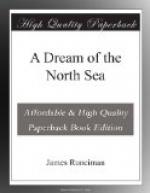After much sleepless labour, which grew more and more intense as the stragglers found their way up, Ferrier summarized his work and his failures. He had treated frostbite—one case necessitating amputation; he had cases of sea-ulcers; cracks in the hand. Stop! The outsider may ask why a cracked hand should need to be treated by a skilled surgeon. Well, it happens that the fishermen’s cracked hands have gaps across the inside bends of the fingers which reach the bone. The man goes to sleep with hands clenched; as soon as he can open them the skin and flesh part, and then you see bone and tendon laid bare for salt, or grit, or any other irritant to act upon. I have seen good fellows drawing their breath with sharp, whistling sounds of pain, as they worked at the net with those gaping sores on their gnarled paws. One such crack would send me demented, I know; but our men bear it all with rude philosophy. Ferrier learned how to dress these ugly sores with compresses surrounded by oiled silk. Men could then go about odd jobs without pain, and some of them told the surgeon that it was like heaven.
Well, there were half a score smashed fingers, a few severe bruises, several poisoned hands, a crushed foot, and many minor ailments caused by the incessant cold, hunger, and labour. Ten men should have been sent home; one died at sea; ten more might have saved their berths if they could have had a week of rest and proper treatment. My hero was downcast, but his depression only gave edge and vigour to his resolution in the end. He had learned the efficacy of prayer now—prayer to a loving and all-powerful Father; and he always had an assured sense of protection and comfort when he had told his plain tale and released his heart. I, the writer, should have smiled at him in those days, but I am not so sure that I could smile with confidence now.
Lennard stuck to his favourite with helpful gallantry, and became so skilled a nurse that Ferrier was always content to leave him in charge. Both men tried to cheer each other; both were sick for home, and there is no use in disguising the fact. When Ferrier one day came across the simple lines—
“Perhaps the selfsame song has found a path
To the sad heart of Ruth, when, sick for home,
She stood in tears amid the alien corn,”
he came near to imitating Ruth. He knew his duty well enough, but the affections and the spirit are strong. Then the almost ceaseless bad weather, and the many squalid conditions of life, were wearing to body and soul.
An abominable day broke soon after Frank had sailed for home, and a sea got up which threatened to shake the spars out of our smack. Half a gale blew; then a whole gale; then a semi-hurricane, and at last all the ships had to take in the fourth reef in the mainsail. The two Samaritans were squatting on the floor in the cabin (after they had nailed canvas strips across the sides of the berths to prevent the




